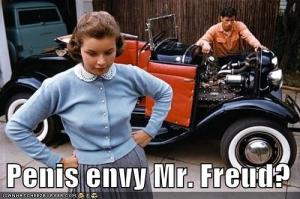
“To feel envy is human, to savour schadenfreude is devilish.”
― Arthur Schopenhauer, On Human Nature
Manifest plainness, Embrace simplicity, Reduce selfishness, Have few desires.” ― Lao Tzu
Obviously, old Lao Tsu was never a parent. And if he was a parent, he wasn’t the Mom in charge of Lao Junior’s science fair project. As women, we know about envy. Penis envy? Oh please, that’s for amateurs. Those of us who’ve turned envy into olympic level competition (aka: mothers) know there are few public forums better suited to pro-level envy than their child’s science fair project expo night.
By the time we’ve accepted that our spawn will probably not be flashing that Superbowl ring or supermodel contract, we’re pretty much into laser-focused envy in areas where we can actually have some effect. Like curing cancer, promoting world peace, or worrying that other women’s children will do better on their SATs, snag admission to CalTech or MIT, and generate billions on their first IPO while our child is still living in our basement, working in a comic book store, and trying to find himself. This usually occurs well before all children in question have hit kindergarten, so by the time they’re called on to produce science fair projects, we mothers have had several years to obsess terrify mentor our children.

And no, Mr. Freud—we seldom waste our finely-honed ninja envy skills on things that would just be handy to have along on a picnic.
I was thinking about this because a friend sent me one of those articles about genius kids whose science fair projects involved using household items to cure the common cold, produce cold fusion, or get rid of garden pests and Justin Bieber. So I dug out the following column from way the hell long ago.
Science Fair and the Attraction of Opposites
Opposites don’t just attract. They marry, reproduce, and give their in-laws something to blame the children’s faults on. For example, marriages are often made up of Savers and Wasters. In ours, I take long hot showers while he sneaks down to the water heater and lowers the water temperature. He considers any articles unused in the last two weeks the rightful property of Goodwill while I don’t notice clutter unless it starts to move around and ask for seconds at dinner.
I bring light to the house and joy to the hearts of power company stockholders while he questions empty rooms. “Who left this light on?” In the interest of efficiency, in fact, he often turns off the lights in occupied rooms, on the general theory that eventually the rooms will be empty. He told the emergency room physician who was stitching him up (and anyone else who asked) that I had split his head open because he was saving energy. What he neglected to mention was that my weapon of choice was the closet door I’d left ajar, and which he ran into in the dark.
I’ve been giving the attraction of opposite forces a lot of thought lately. Those of you without school-age children are saying to yourselves, “Barb doesn’t have enough to do. She needs a hobby, like spinning dryer lint or seeking the Democratic nomination for president.” But parents with school-age children are saying, “Must be Science Fair season again.”

My kid didn’t get honorable mention at Science Fair? But… we had it all. Styrofoam volcano, electronic buzzers, grow lights, rodents… Now how is she supposed to get into MIT?
The most important thing to realize about a science fair is that it has absolutely nothing to do with science. If it did, it would involve actual scientists, instead of parents whose last documented science fact was absorbed in seventh grade biology class when they discovered that the disturbingly long earthworms they were dissecting would fit neatly through the door holes in someone’s locker. Science fairs are actually a promotional gimmick dreamed up by the rodent and little electronic buzzer industries. This is why 89.9% of all science fair projects involve rodents, little electronic buzzers, or rodents ringing little electronic buzzers. (The other 10.1% involves volcanoes, of course.)
The 10-year-old mentioned casually last weekend that her science fair project was due on Wednesday. “But don’t worry,” she assured me. “I have the experiment all planned. I’m going to investigate whether my rodent can see color by having her run a maze involving little colored lights leading to a peanut-reward.” If the rodent made it, we’d all stand around and ring little electronic buzzers.

EXAMPLE OF WINNING SCIENCE FAIR EXPERIMENT:
Rodent pushes little electronic buzzer in maze, triggering volcano.
It was a great idea, but we ran into two problems. The first problem was that every little electronic buzzer in a three-state region had been snapped up by her classmates. (These buzzer-buyers had a great future as pre-meds who check out ALL the library copies of assigned class-readings and keet them until after finals.) The second problem was that our only resident rodent is a senior citizen hamster who tends to bite people on the fleshy part of the nose if she’s feeling crotchety. Asking our geriatric rodent to run the maze seemed like pulling Grandma out of the rest home and sending her to work at Walmart. The only other rodents we could think of who might be willing to brave the bright lights for peanuts were all off campaigning for the primaries.
Which brings us to the theory of the attraction of opposite forces. [See what I did there? I’m a professional writer, though, so don’t try this at home kids.] My children were trying to explain to me how the crystal radio they built could work without batteries. It seemed to have something to do with magnets being attracted to rock music radio waves. I suggested that if they could explain it to a science-impaired person like me, it might pass at science fair.
We started with the basics. She showed me how you can make your own compass by sticking a needle through a bead of styrofoam, rubbing it against a magnet and floating it in a bowl of water. I understood this phenomenon perfectly. It’s caused by magic. After that, she lost me in technical details of transformers, coils, and radio transmitters. The final results were so impressive that I didn’t even bring up nitpicking little details like whether I’d get back the stereo’s transformer or the starting coil from my car’s engine. (After all, we have a crystal radio and an excellent bus system.)
But something still seemed to be missing. Maybe if she added a rodent holding a little electronic buzzer?
—Champaign-Urbana News-Gazette, March, 1991 ©Barb Taub

hahaha ah the angst of parenthood: not for the faint of heart!
LikeLiked by 1 person
I should reply with some smarmy comment about how it was all totally worth it… Yeah, I should really do that.
LikeLike
You always make me laugh so!
LikeLiked by 1 person
Thanks! That made my day.
LikeLike
Very funny Barb and truly it is a classic as I see it has survived 23 years and is sttill pertinent.
LikeLiked by 1 person
I prefer to think that I’M the classic survivor. But thanks so much.
LikeLike
‘…handy on a picnic.’ Such wisdom, shrouded in humour.
As a step-mother, I must have passed the science projects on to the biological mom. Or I’ve blotted them out. But when it was oral composition time, I was gold.
LikeLiked by 1 person
So you never had to make a papier-mâché volcano and explode it with vinegar and baking soda? Woman, you haven’t lived…
LikeLike
I loved this! Where is the 10-year-old now?
LikeLiked by 1 person
She’s a human rights attorney (blogs at http://www.wrongingrights.com/about )
LikeLike
The fact that you recycled this column from 1991 is more impressive than any class science project, ever, Barb!
Who’d you coerce to retype it for you from newsprint?
A study must be done! The effect of newspaper articles on the digital age! Science teachers beware. Be scared. Social and media projects, coming at ya’.
LikeLiked by 1 person
I’d like to pretend I still have the original file, which I probably typed on our original Mac with the 7-inch amber screen. By now but it’s probably in the Smithsonian’s ancient artifacts collection. Must admit my own little flying fingers did the typing both times. And what’s with that? Shouldn’t we have voice recognition (here in our flying cars…)?
LikeLike
Right, Barb? My big mouth about technology: Don’t call me until we have the Jetsons car.
All Siri can do is point us to web sites. Big help, that?!
Even the old black and white newsroom movies had “Get me rewrite!”
LikeLiked by 1 person
My old editor was a great guy who used to talk about the old days when there were two daily papers, each trying to scoop the other. Or how you had to be very polite to the guys who set type because if they got angry at you they might “accidentally” drop the whole page of type. But I don’t think even he ever had “rewrite”.
Once for another …er… form of media, I had to interview him. I asked him if he was worried about digital replacing print media. He said that he wouldn’t worry until you could take your computer into the bathroom with you. Thought about that while I was standing in line for the ladies room at a concert only a few years later, reading the Times on my phone.
LikeLike
Man, he was a soothsayer, Barb.
I worked as a copy aide for the Washington Post and the hot lead printer put the type on for my page proof with all the bylines upside down, I trotted them upstairs to the copy editors. Initiating to the new copy aides, I found out.
Old, I am.
LikeLiked by 1 person
Mandatory assistance at the science fair would be a great form of birth control
LikeLiked by 1 person
That must be true. None of my children, all science fair survivors, has yet produced any future science fair project entrants…
LikeLike
Perhaps we should suggest it to the President, although I am sure there would be many on the right who would oppose the science angle.
LikeLike
Simply lovely! I’ve never had to walk a child through a science fair project, though I had to do them myself when I was in school…which of course why the Americans landed on the moon and the Italians didn’t 😉
LikeLiked by 1 person
Well, but nobody is actually on the moon now, are they? While the Italians still have tagliatelle and the statue of David. I’m just saying…
LikeLike
Yep … makes you wonder doesn’t it 😉
LikeLike